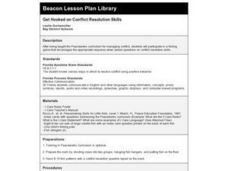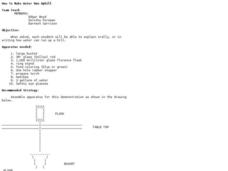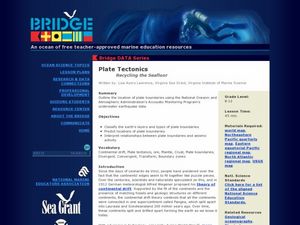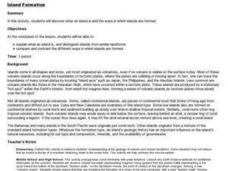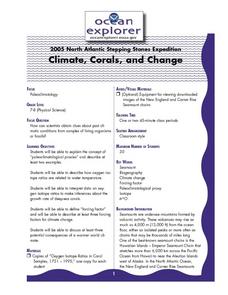Curated OER
The Vast Ocean
Students explore oceans, and demonstrate reading comprehension skills, including reading strategies, inference, literal meaning, and critical analysis.
Curated OER
Get Hooked on Conflict Resolution Skills
Learners discuss strategies for solving conflicts and acting as peacemakers. They answer questions regarding conflict resolution skills in a fishing game, and respond to a conflict in a written journal entry.
Curated OER
Altimetry
Fifth graders accurately measure the distance to eight points on an uneven surface by conducting a simulation of sattelite altimetry. They create a two-dimensional model of the simulated ocean surface by graphing data from the Radar Run...
Curated OER
Dark and Beautiful Caves
Students research how caves form. They describe the major stone formations in caves by taking notes. They construct a clay model of a cave and mark each formation making it easy to identify in the legend.
Curated OER
Reading Maps of the East Pacific Rise
Students make qualitative and quantitative observations and use various maps to investigate the features of the East Pacific Rise The study actual bathymetric maps of the EPR region. They identify key features of the ridge and explore...
Curated OER
Exploring the Night Sky: Fall/Winter
Students explain how moon phases occur. They explain three ways that the night sky has been used through history. Students locate some of the constellations in the night sky. They discuss stories and myths surrounding stars.
Curated OER
Fragments
In this sentence correction worksheet, students read the passage about a mermaid. Students then locate and fix the fragments within the passage.
Curated OER
How to Make Water Run Uphill
Young scholars observe science demonstration. In this science instructional activity, students watch an experiment showing water moving up from an area of higher concentration to an area of lower concentration, due to a change in...
Curated OER
Prepositions
In this prepositions learning exercise, students complete a ten question multiple choice on-line quiz about the correct use of prepositions.
Curated OER
Impersonal Pronouns: It and There
In this impersonal pronouns worksheet, students complete the text by typing "there is", "there are", "it is" or "it's" in the paragraph.
Curated OER
Adverb Clauses
In this adverb clause worksheet students must fill in the blanks in sentences using the appropriate adverb or adverb clause. Students make their answer selection and receive immediate feedback.
Curated OER
Stative and Dynamic Verbs
In this stative and dynamic verb activity, students identify the section of the sentence which contains a grammatical mistake. Each sentence has four underlined sections from which to choose.
Curated OER
Cloze Exercise: Using Qualifiers
In this using qualifiers worksheet, students use either "much" or "little" or "many" or "few" to correctly complete sentences. Students use "much" and "little" for non-count nouns and "many" and "few" for count nouns.
Curated OER
This Life Stinks
Students study cold seeps and see how organisms obtain energy from methane. In this sinkholes lesson students examine the relevance of chemosynthesis to communities.
Curated OER
Diatom Ooze
Students explore seafloor sediment. In this ocean environment lesson, students describe the characteristics of different types of seafloor sediment and oozes. They compare and discuss locations of sediments and oozes by plotting the...
Curated OER
Mystery Object Puzzle
For this puzzle worksheet, students must decide on a mystery object. Students are provided with 10 clues and corresponding picture parts to discover what the object is.
Curated OER
Vietnam War Gallery Worksheet
In this World History worksheet, 10th graders examine various photos during a gallery walk. Students write answers to the questions.
Curated OER
Plate Tectonics: Recycling the Seafloor
Young scholars classify earth's layers and plates using Ocean Seismicity data. In this plate tectonics lesson, students outline where the plate boundaries are on the world map. They then compare these predicted boundaries with USGS map...
Curated OER
Head to Foot
Students describe the body form and major anatomical structures of squids and describe some unusual or unique features of newly-discovered deep water squid species. They infer what types of food squids use from their anatomical features.
Curated OER
Sum + It = Up
Students review silent reading techniques as well as summarization. They read copies of "Forest Life" silently and complete a story web to organize the main points of the story. They then use use the points to write a brief paragraph to...
Curated OER
Activity 1-Cold Water, Hot Water and Super-Heated Water!
Students investigate hydrothermal vents by observing a simple model designed to show that hot water rises when it's heated. First, students listen as the teacher explains hydrothermal fluids and vents. Students watch as the teacher...
Curated OER
Island Formation
Students create models of how islands are formed by hot spots and then write a summary of their observations and of how they think their model relates to volcanic hot spots and island formation.
Curated OER
WHY WE AREN'T FILTER FEEDERS
Students describe three methods of obtaining food: scavenging, filter feeding, and hunting. They describe three methods of obtaining food: scavenging, filter feeding, hunting, and list at least two reasons why humans are not considered...
Curated OER
Climate, Corals, and Change
Students examine oxygen isotope ratios and how they are related to water temperature. They also identify three forcing factor changes for climate change.
Other popular searches
- Sea Floor Topography
- Sea Floor Diagram
- Sea Floor Mapping
- Sea Floor Sediment
- Sea Floor Features
- Sea Floor Bathymetry
- Sea Floor Drilling
- Sea Floor Bathmat
- Sea Floor Spread
- Convection Current Sea Floor
- Mapping the Sea Floor
- Sea Floor Mappng



